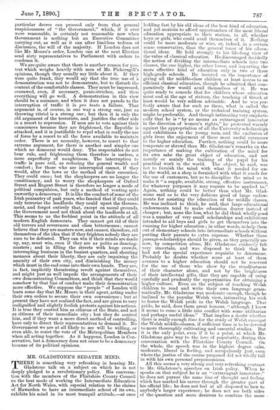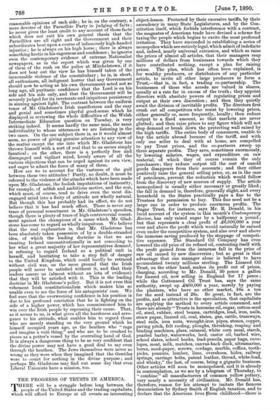MR. GLADSTONE'S SEDATER MIND r ERE is something very refreshing in
hearing Mr. Gladstone talk on a subject on which he is not deeply pledged to a revolutionary policy. His conversa- tion with the members of the Flintshire County Council on the best mode of working the Intermediate Education Act for North Wales, with especial relation to the claims of Hawarden to have an intermediate school of its own, exhibits his mind in its most tranquil attitude,—at once holding fast by his old ideas of the best kind of education, and yet anxious to afford opportunities of the most liberal education appropriate to their station, to all, whether boys or girls, who could avail themselves of it. Nothing could be more moderate or wise, or, indeed, in a certain sense conservative, than the general tenor of his educa- tional ideas. He held strongly to his life-long view of the value of classical education. He discouraged decidedly the notion of dividing the intermediate schools into two classes, the one higher, the other lower, and imparting the more effective kind of education only in two or three high-grade schools. He insisted on the importance of giving all the middle-class children at least access to an efficient classical education, though he admitted, that com- paratively few would avail themselves of it. He was quite ready to concede that for children whose education must end at the age of sixteen, the teaching of Greek at least would be very seldom advisable. And he was per- fectly aware that for such as these, what is called the modern school system, or the technical training system, might be preferable. And though intimating very emphati- cally that he is "by no means an extravagant innovator in the direction of women's rights," he protested warmly against the appropriation of all the University scholarships and exhibitions to the young men, and the exclusion of• girls from the enjoyment of these most useful entrances to the higher education. Further, nothing could be more temperate or shrewd than Mr. Gladstone's remarks on the importance of making the cultivation of the mind for its own sake the great object of education, and not merely or mainly the training of the pupil for his practical work in the world. The object, he said, was not to furnish the mind with what it needed for use in the world, as a shop is furnished with what it needs for the use of customers, but so to discipline the mind as to make it "a supple, available, strong, effective instrument, for whatever purposes it may require to be applied to."
Again, nothing could be better than what Mr. Glad- stone said as to the very dubious good of large endow- ments for assisting the education of the middle classes.
He was inclined to think, he said, that large educational endowments tend to make education dearer instead of cheaper ; but, none the less, what he did think wholly good was a number of very small scholarships and exhibitions intended to aid boys and girls to get themselves into the running for higher education ; in other words, to help them out of elementary schools into intermediate schools without putting their parents to extra expense. Whether these passage-scholarships should be given, as they generally are now, by competition alone, Mr. Gladstone evidently felt very uncertain, and was disposed to think that he had not the special experience requisite to determine_ Probably he doubts whether some at least of these avenues to a higher education should not be reserved for the use of those who show by the steadfastness of their character alone, and not by the brightness of their intellectual gifts, that they are capable of using carefully and prudently the opportunities for obtaining a higher culture. Even on the subject of teaching Welsh children to read and write their own language gram- matically, Mr. Gladstone was moderate enough, though he inclined to the popular Welsh view, intimating his wish to foster the Welsh pride in the Welsh language. That pride, he said, does them great honour, "although I know it seems to come a little into conflict with some utilitarian and perhaps useful ideas." That implies a doubt whether there is really enough time for the study of Welsh amongst the Welsh middle-classes, if sufficient time is to be devoted to more thoroughly cultivating and essential studies. But it is the only point, even if it be a point, at which Mr. Gladstone gave way to the love of popularity, during this conversation with the Flintshire County Council. On the whole, the speech was in the highest degree calm, moderate, liberal in feeling, and scrupulously just, even where the justice of the course proposed did not wholly fall in with his own personal prepossessions.
All this seems a very strong and very refreshing contrast to Mr. Gladstone's speeches on Irish policy. When he speaks on that subject he is an "extravagant innovator ;" he does not pursue the same line of thought and feeling which has marked his career through the greater part of his official life ; he does not feel at all disposed to bow to anybody's larger experience ; he does not see both sides of the question and seem desirous to combine the more Liberal Unionists have a mission, too. Other articles will soon be monopolised, and it is already





































 Previous page
Previous page